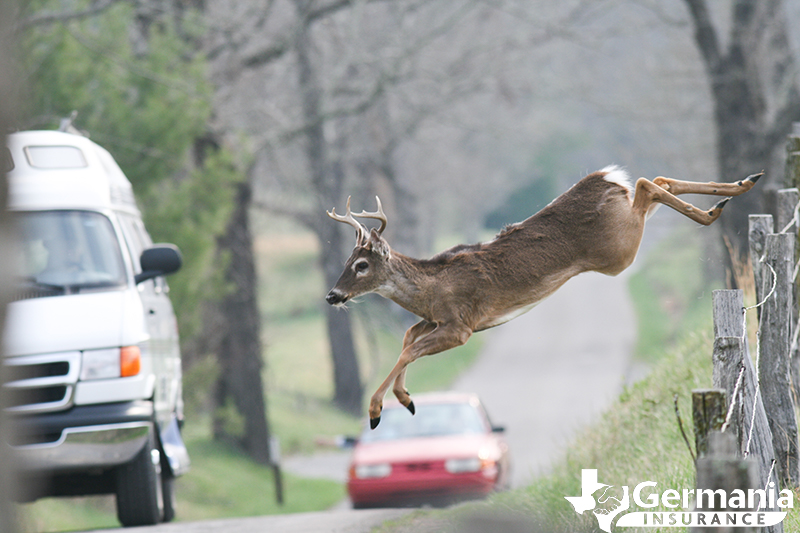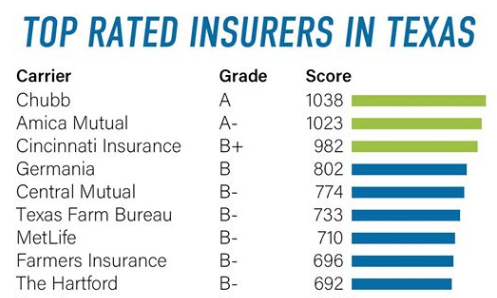Texas is a land of rolling hills, dense forests, wide open plains, and huge populations of wildlife. In most of the state, you can travel the winding highways through the diverse landscape without ever coming into contact with any of the critters that call Texas home. However, with the growing populations of both people and wildlife, our two worlds are bound to collide sooner or later. So how can you avoid animal-vehicle collisions in Texas and what do you do if you can't?

The facts about wildlife collisions in Texas
Texas is teeming with both native and non-native species (
like feral pigs). While many of them are unlikely to cause an serious damage to your vehicle, there are 1.5 million wild pigs and 3.6 million white-tailed deer. Both of these animals can cause serious trouble for Texas motorists.
In fact, these types of accidents have steadily increasing since 1975. In the past 10 years, Texas has had the highest number of deaths as a result of
vehicle-animal collisions. This is a complex issue, but it is primarily due to the increasing number of motorists, growing animal populations, and the rural nature of many Texas roads.
Rural roads often have poor lighting that can make it difficult to spot crossing animals. Unlike most major highways, these roads have twists and turns and regularly cut through wooded areas or agricultural fields, where many of these animals live.
Because of these factors, your chances of colliding with an animal in Texas are about 1 in 157. While the cost of repairing a vehicle damaged by such an accident can vary, the national
average cost per claim is more than $4,500.
How to avoid wildlife on Texas roads
So what can Texans do to minimize the risk of such devastating encounters? Obviously, we can't keep the deer from crossing the road (regardless of why it decided to do so). There are, however, plenty of things motorists can do to prevent accidents with our animal neighbors.
Stay alert - It can never be said enough that being alert is one of the best ways to stay safe on the road. Deer come out to feed during dusk and usually stay out until dawn. They prefer wooded areas and plots of land with tall vegetation or crops. That's why it's important to be on the lookout during the lower-light hours and when traveling on roads that pass through these environments.
There are often signs placed on roads where animal traffic is known to be higher than normal. If you see one of these, be on the lookout! They are there precisely because of past problems with animal crossings and collisions.
Keep your brights on - When driving at night, it's important to use your high beams as long as there isn't any oncoming traffic. Using your brights can help you see more of the road and allows you to spot the reflective eyes of nocturnal animals like deer.
Buckle up - Always wear your seatbelt! Even if you manage to pump the brakes and avoid hitting an animal, the sudden stop can be dangerous if your belt isn't buckled.
Look out for groups - Both deer and wild hogs often travel in large groups. If you spot an animal crossing, there's a good chance that others are not far behind. That's why it's important to be cautious and keep your speed down even if the first animal has finished crossing.
Keep it steady - As difficult as it might be, experts say that you should never swerve to avoid striking an animal on the road. Often, a sharp and sudden turn can flip a vehicle or put you in the path of oncoming traffic. Both of these things are far more likely to be fatal than the alternative. Instead, if you spot an animal in the road ahead, engage your brakes firmly, but maintain control of the steering wheel and stay in your lane. Striking an animal is never good, but the force of an oncoming vehicle is far more deadly.
Beware rutting season - White-tailed deer are the most active and unpredictable during their yearly rutting season. This is great for hunters, but can be particularly dangerous for drivers. Fortunately, this range is relatively short and takes place between October and December. During this time, it's important to be extra cautious when driving on rural roads or areas with dense deer populations.
Avoid whistles - Deer horns or deer whistles are vehicle attachments that claim to emit sounds which alert deer to oncoming vehicles. While this sounds nice,
numerous studies by wildlife researchers have failed to prove their effectiveness. In fact, because deer are so unpredictable, they are just as likely to freeze at the sound. It is always better to be alert and rely on your own senses in order to avoid a collision.
What to do if you've had an animal collision
Get off the road - First and foremost, if it is safe, turn on your hazard lights and move to a safe place on the side of the road. If it is dark, make sure you are clearly visible to other vehicles by using reflective cones or markers.
Call 911- Once you're in a safe place, it's time to call law enforcement. This is absolutely necessary if either the animal or your vehicle are blocking the road. Even if this isn't the case, having a police report can be helpful when filing for an insurance claim.
Law enforcement is also necessary for removal of the animal, regardless of whether it is alive or not. They can assess the situation and if necessary, call the
local Texas Game Warden to handle the injured or deceased animal. Keep in mind, i
t is not legal to take home a deer or its antlers if it died in this manner.
Leave it alone - If the animal is still alive, stay away from it. Frightened, injured animals will defend themselves and could very easily injure you if you're too close. Again, let the Game Warden handle it.
Document the incident - When you get a safe opportunity, consider taking photos of the incident for insurance purposes. More information is always helpful for an insurance company when handling a claim.
Make sure your car is safe to drive - Before hopping back into your car and taking off, it's important to give it a thorough inspection. Check for punctured tires, broken headlights, damaged windshields, and leaking fluids. If possible, check the underside of your vehicle, too. While deer typically only cause damage to the exterior portion, animals that are lower to the ground, like hogs, can cause serious undercarriage damage.
If you're unsure, it's always better to be cautious and call a tow truck.
Many insurance companies, like Germania, offer roadside assistance for policyholders, which can help you get your vehicle out of a dangerous spot.
File a claim - After having a collision with an animal, make sure to contact your insurance company as soon as you can in order to file a claim. The sooner you call, the sooner the claim can be processed. It's important to note that not all auto policies cover such an accident, so make sure to contact your agent to be sure. For example, basic liability coverage will most likely not pay for repairs while a more comprehensive plan will.
If you are a Germania Insurance customer and need to file an auto claim, you can do so here. If you'd like to learn more about Germania's auto coverage, talk to your agent, or find one here.
Get it fixed! - If you've ever had an animal-vehicle collision, you know that even the small Texas white-tailed deer can cause serious damage. Fortunately, Germania policyholders have access to
Germania Premier Service (GPS) - a network of trusted preferred auto repair facilities.
In fact, in a recent nationwide survey by CRASH Network, over 1,000 body shops graded insurance companies based on claims handling, attitude, and payment practices. Germania ranked No. 4 in Texas, earning an overall B grade.
